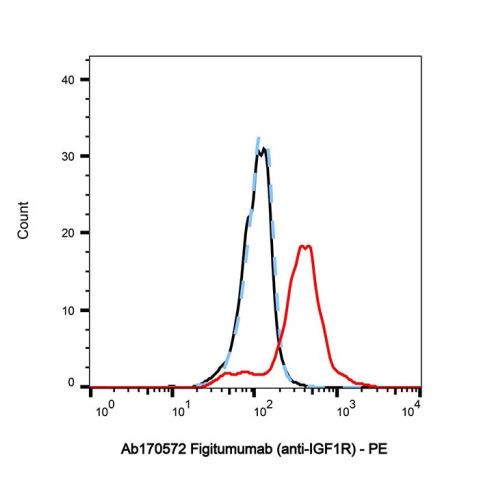| In Vitro |
Figitumumab (CP-751871) (152 pM-10 μM; 3 days) inhibits cancer cell proliferation[1]. Figitumumab (1 μg/mL; 1 min or 24 h) induces the down-regulation of IGF-1R[2]. Figitumumab inhibits IGF1-induced autophosphorylation of IGF1R with an IC50 of 0.42 nM, and indirectly inhibits AKT activation[2]. Figitumumab recognizes the IGF-1R/IR heterodimer complex[2]. Cell Proliferation Assay[1] Cell Line: Breast, colon, lung small cell, and non–small cell cancer lines Concentration: 152 pM-10 μM Incubation Time: 3 days Result: 15 cell lines (NCIH441, NCIH526, SW403, CACO2, SW48, NCIH524, SKCO1, SNUC1, LS1034, COLO205, MDAMB361, NCIH508, LS513, MCF7, NCIH378) were highly sensitive to the drug at IC50 values ≦ 100 nM. Western Blot Analysis[2] Cell Line: 3T3/IGF-1R cell Concentration: 1 μg/mL Incubation Time: 1 min or 24 h Result: Blocked IGF-I- or IGF-II-induced autophosphorylation of the IGF-1R.
|
| In Vivo |
Figitumumab (CP-751871) (31-125 μg/mouse; i.p.; once) induces the down-regulation of tumor associated IGF-1R in mice[2]. Figitumumab (62.5-500 μg/mouse; i.p.; once) inhibits the growth of s.c. xenografts derived from colon (Colo-205), breast (MCF7), and lung (H460) cancer cell lines in mice[2]. Animal Model: Female athymic mice (CD-1 nu/nu) bearing NIH3T3/IGF-1R tumors[2] Dosage: 31 to 125 μg per mouse Administration: Intraperitoneal injection, once Result: Resulted in a serum Cmax between 12 and 24 hours. At 24 hours, there was a dose-dependent reduction of IGF-1R protein in tumors, with 50% reduction observed at a serum concentration of 15 μg/mL. Resulted in a down-regulation of IGF-1R from the tumor. The half-life in an athymic mouse was determined to be 4 to 6 days by longer-term studies. Animal Model: Female athymic mice (CD-1 nu/nu), human Colo-205 tumor xenograft model[2] Dosage: 62.5 μg or 250 μg per mouse Administration: Intraperitoneal injection, once Result: Inhibited the tumor growth.
|
